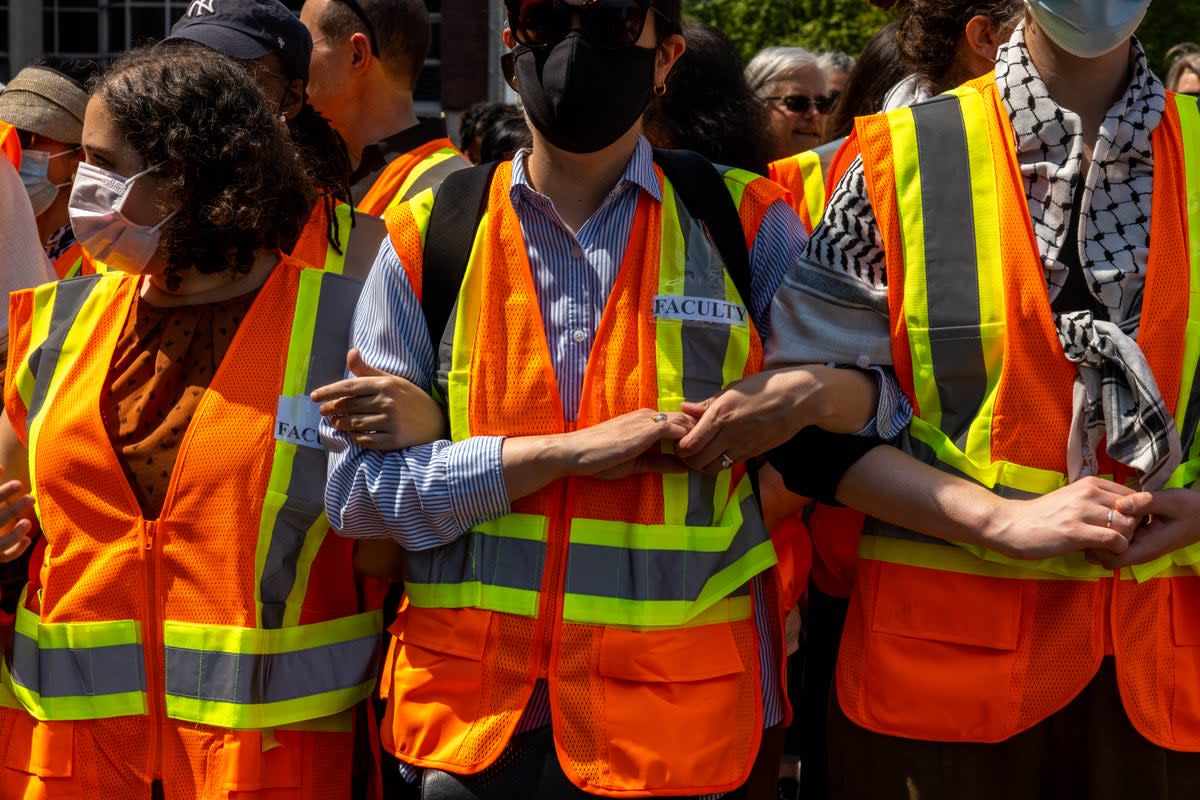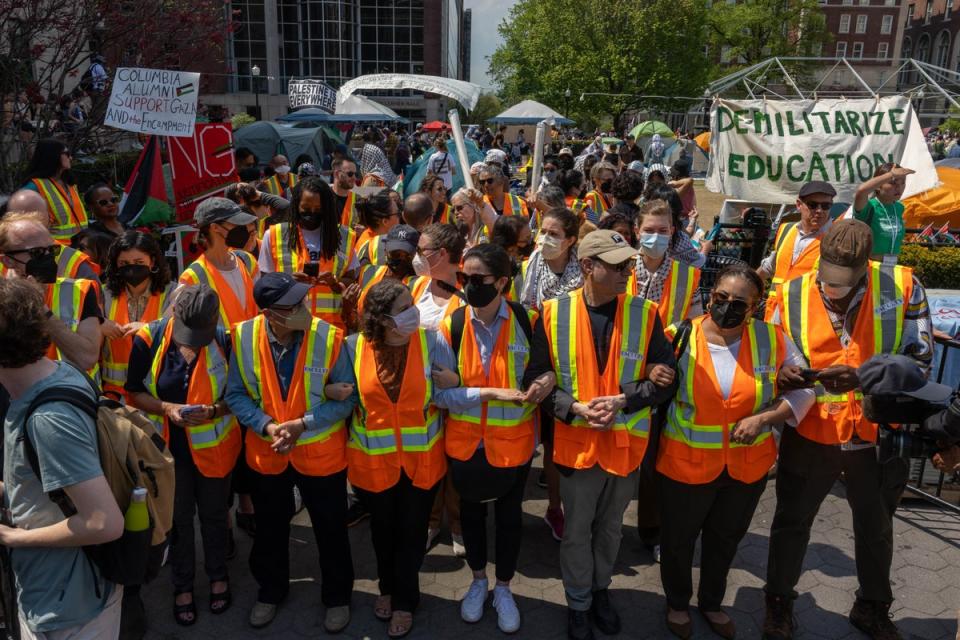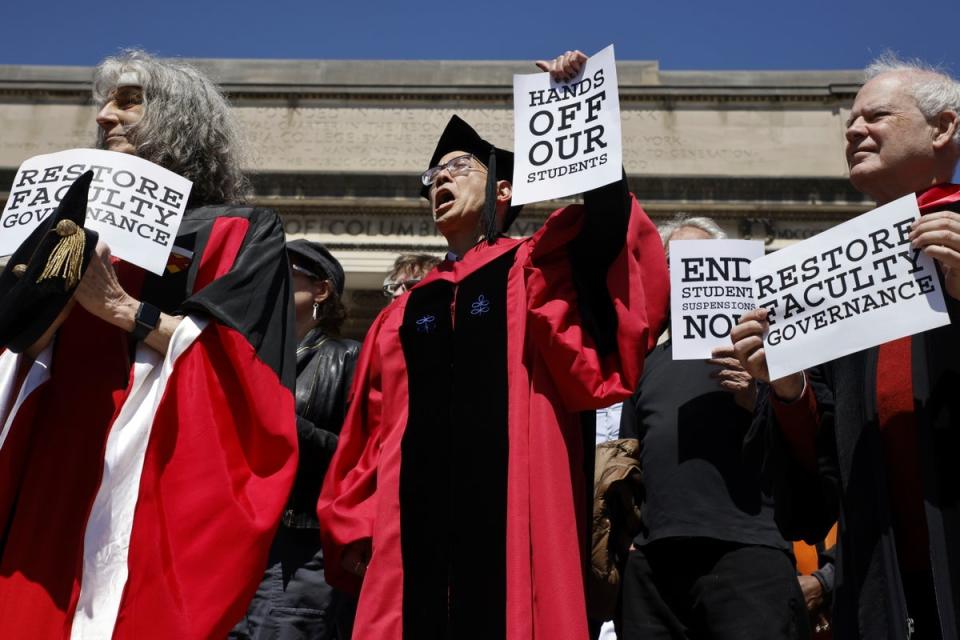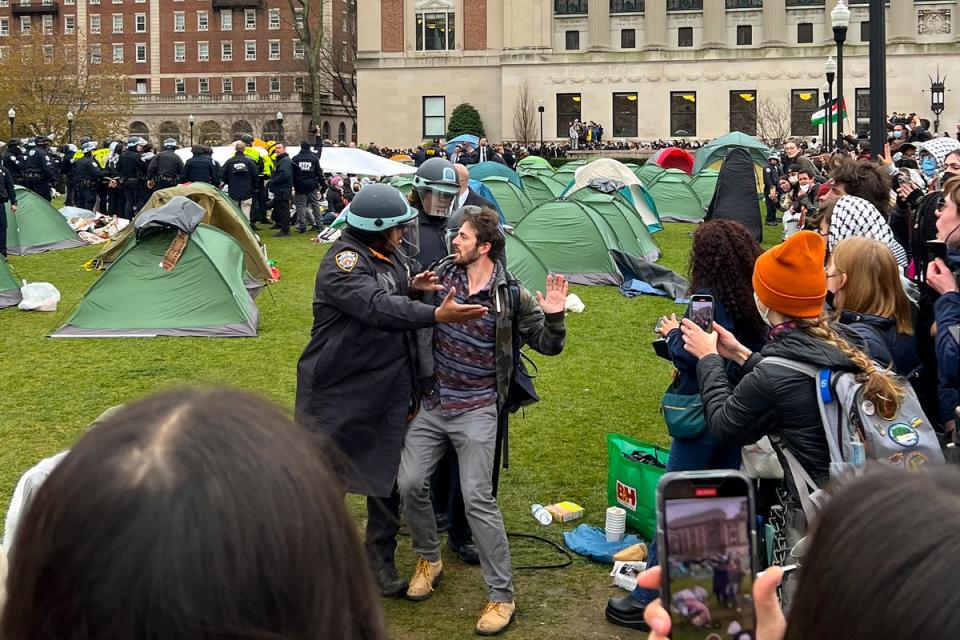Professors are putting their bodies and careers on the line supporting students protesting for Gaza

As students across the country face riot police, arrests and mass suspensions for protesting against the war in Gaza, there is another smaller group putting their bodies and futures on the line right next to them: their professors.
Many are joining in solidarity with the cause, others because they are concerned about freedom of expression on campus, and some because they see a real-time example of the very classes they teach.
Faculty staff have also been on the receiving end of the same violence faced by their students. At Emory University, in Georgia, an economics professor was videoed being thrown to the ground by police after she verbally intervened in the arrest of a student.
In another video from Emory, the chair of the philosophy department was pictured being led away in handcuffs as she implored witnesses to “call the philosophy department office and tell them I’ve been arrested.”
“For many of us, we are not without any fear and anxiety,” Professor Steven Thrasher, who teaches social justice in reporting at the Medill School of Journalism at Northwestern University, told The Independent. He has been involved with Palestinian solidarity campaigns for years and is now on the front lines of student protests on campus, including forming human barricades with other college staff to protect protesters from police.
Forming a faculty defense line with faculty to try to stop arrests. Might be my last tweet for a while. Free Palestine and bless our courageous students! pic.twitter.com/MwvE95MRPP
— ??Prof. Thrasher?? (@thrasherxy) April 25, 2024
Students have faced temporary suspensions from their universities, but faculty staff have an altogether different set of risks to navigate. As well as the risk of police violence, getting arrested or suspended could mean losing their livelihoods, even their careers.
“It can be very scary to think about losing a job or your career in a particular field,” Thrasher continued. “But that pales in comparison to anything that’s happening in Gaza. I think lots of people have awareness of that.”
Thrasher has been aiding student protesters from the start — faculty got word from a student group that they were going to set up a campus encampment and they wanted professors to support them
“We take most of our leads from them,” Thrasher said. “We give advice when they’re asked but we have a system to make sure there’s always faculty members with them.”
The reality of arrest or suspension prompted intense discussions between university staff about their various levels of risk depending on their employment status and job security, which have determined how they support the protests. A faculty member could decide if they are willing to be arrested that day, for example, or simply be an observer.
“We try to have a sense of who has the most risk,” Professor Thrasher said. “Sometimes it’s very clear, like people who are dependent upon visas and can get deported are at very high risk. Professors of nursing or medicine where they could have their licenses revoked, they’re very high risk.”

On Monday, as Columbia University announced a deadline for the protest encampment there to disband, faculty staff formed a protective chain around the perimeter.
These scenes have prompted faculty members who don’t necessarily agree with the protesters’ cause to become involved in some way.
“Many of us are appalled by the ways the administration has capitulated to right-wing politicians who are taking advantage of this moment to savage the autonomy of the university and the basic values of academic freedom,” said Nara Milanich, professor of history at Barnard College, which is partnered with Columbia University.
Professor Milanich helped to organise a rally last week that was not about the war in Gaza, “but rather about defending the basic values of the university and academic life.”
The rally-goers called for the decriminalisation of students who had been suspended and arrested for a peaceful protest on campus.

“Clearly there was wide consensus on the basic principles. You don’t need to agree with the substance of the protestors’ opinions to agree they have a right to express them,” she said.
For Bassam Khawaja, who teaches human rights at Columbia Law School, the sight of police arresting his students for protesting felt like the classroom coming to life.
While he hasn’t been directly involved in the protests, he has spoken out against the university’s heavy-handed response, including inviting the New York Police Department onto campus in the first days of the encampment to arrest more than 100 students.
“It’s quite unusual to have to be doing advocacy to ensure that our only students here in New York have the same right to protest to hold peaceful protests and express our support for human rights,” he told The Independent.

The Columbia president asking the NYPD to shut down student protests went against a decades-long tradition at the university.
“You’re seeing outrage from faculty, not just at Columbia, but at universities across the country, including faculty who do not support the protests themselves, but nevertheless are outraged that the university takes the heavy-handed approach and calling in police to arrest their own students.”
“I think for many, many faculty across the country that just crosses a line,” he said.
